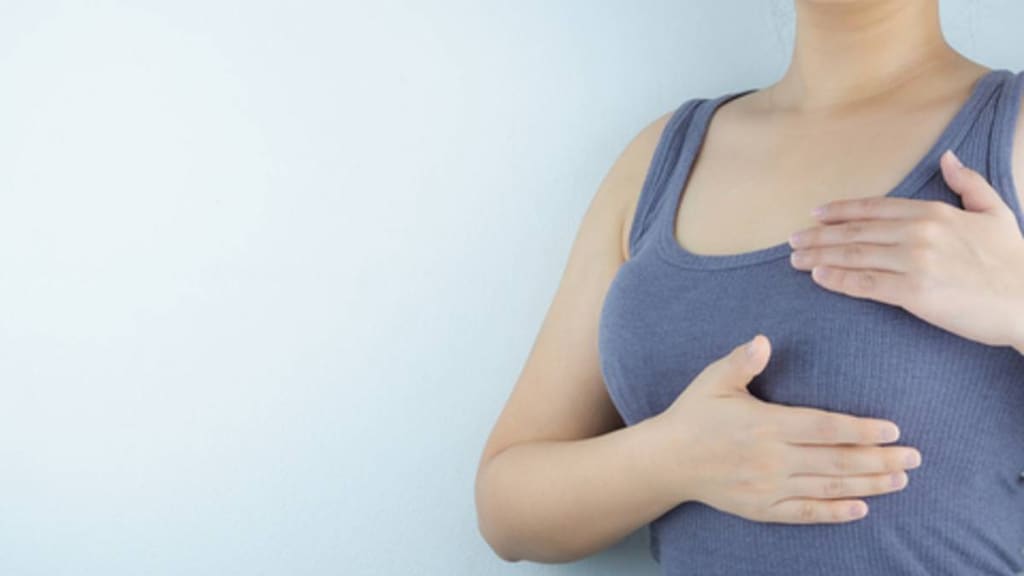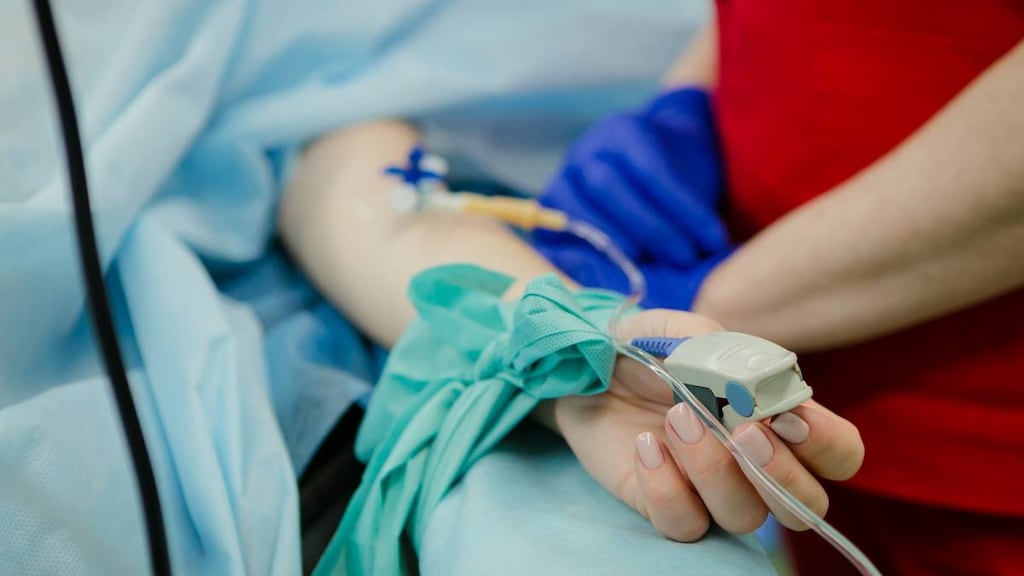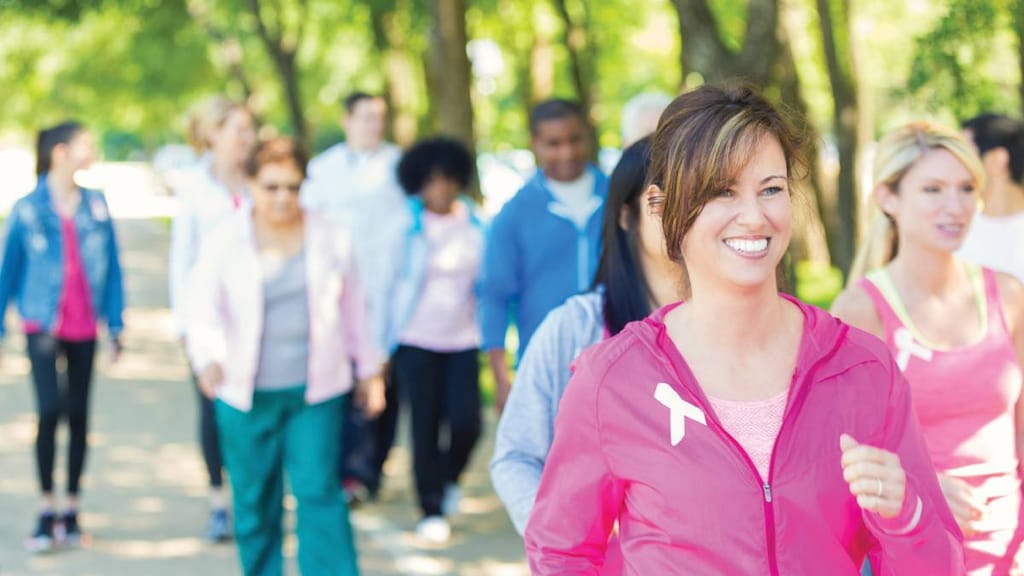Breast Cancer Diet Tips: Foods to Eat, Foods to Avoid

You know the keys to staying healthy with breast cancer: quit smoking, get restful sleep, increase physical activity, maintain a healthy weight and eat a healthy diet. But with the onslaught of nutrition news, it can be hard to figure out the essentials of that last one — the right healthy diet to reduce breast cancer risk or recurrence.
One important goal is to trim belly fat. In the United States, approximately two-thirds of Americans are overweight or obese. This epidemic has been linked to an increased risk for numerous diseases, including heart disease, stroke and diabetes, according to the American Cancer Society. Studies also indicate that an expanding waistline in particular can contribute to the risk for certain cancers, including breast cancer. Too much belly fat tells the body to produce higher levels of insulin — more than needed — which might be the connection to both diabetes and cancer. Belly fat can also disrupt hormones, increasing the risk for both breast and uterine cancers, according to the University of Texas MD Anderson Cancer Center.
To both lose excess weight and improve your health, here are the essentials to a better diet.
Start with healthy diet basics
The 2015-2020 Dietary Guidelines for Americans, published by the U.S. Department of Agriculture, recommend eating a variety of foods from the healthy food groups: all types of vegetables, whole fruit, whole grains, fat-free or low-fat dairy, a wide range of protein including seafood, lean meats, poultry, eggs, legumes, nuts and seeds and soy foods, and unsaturated oils. They suggest avoiding saturated fats and trans fats, added sugars and excessive sodium.
These tips will help you drill down on those guidelines and take them a step further to fight breast cancer:
- Increase plant-based foods. The American Institute for Cancer Research recommends a diet that is predominantly fruits, vegetables, whole grains, beans, nuts and seeds with very small portions of dairy. This will give you cancer-protective nutrients including fiber, vitamins, minerals and phytochemicals — naturally occurring plant chemicals that can stimulate the immune system, reduce inflammation that can cause cancer growth and slow the growth rate of cancer. In terms of portions, fill two-thirds or more of your plate with vegetables and one-third or less with fish, poultry or lean meat.
- Go Mediterranean. There have been dozens of studies linking the Mediterranean diet — plentiful in fruit, vegetables, olive oil, nuts and fish — with better health, including a lower risk for breast cancer, according to research published in Nutrients in 2018. That study found that women who followed this diet could lower their breast cancer risk by 20 percent.
- Cut the total fat on your plate. A study published in The Journal of Nutrition followed 50,000 women for 20 years. One group limited their daily fat calories to 20 percent of their total daily intake, added more fruits, veggies and whole grains and limited meat, cheese and other high-fat foods. The other group followed a more typical diet, with 35 percent of calories coming from various fats. The women who cut their fat had better survival rates after breast cancer and also prevented heart disease and slowed down diabetes, according to the Fred Hutchinson Cancer Research Center.
- Go meatless more often. With concern growing about meat for health and environmental reasons, the trend of Meatless Mondays has extended to other days as well for many people. Some are taking it even further by following a completely plant-based diet. As the American Institute for Cancer Research explains, a vegetarian diet can include dairy and eggs while a vegan diet contains only plant foods or plant-derived processed foods such as vegan cheese. With either option, it’s important to meet all your nutritional needs. With a vegan diet in particular, you’ll need to carefully plan to get enough protein from legumes like beans, dried peas and lentils, nuts, seeds, soy foods like tofu and tempeh, and grains such as seitan and quinoa, according to the Vegetarian Resource Group.
- Avoid high-heat cooking. When you do eat meat, how you cook it can be crucial. A study published in the International Journal of Cancer found cause for concern regarding the link between meat consumption, breast cancer and cooking methods. The sampling included more than 42,000 women 35 to 74 years old, with no breast cancer diagnosis but with sisters or half-sisters who have or had breast cancer. The study noted that cooking methods using high temperatures or that involved direct contact with a flame, in either a frying pan or on the grill, produced carcinogenic chemicals, called heterocyclic amines, that may increase the risk for breast cancer. The study also noted that substituting poultry for red meat could reduce breast cancer risk.
Foods to eat, food to avoid: the short list
As you create the healthiest diet for you, rebalance where you put your calories.
- Choose high-fiber whole grains. These are the healthy carbs — vegetables, fruits and whole grains. The current recommendation for daily fiber intake is 28 to 35 grams, according to the Centers for Disease Control and Prevention. Fiber carbs play an important role in breast cancer prevention. According to a study published in Oncotarget, getting fiber in your diet may reduce breast cancer risk by 12 percent, and for every additional 10 grams of fiber you get a day, you can lower your risk by another 4 percent. Whole grains, including whole wheat, millet, barley and oats, have phytochemicals that are particularly effective at targeting breast cancer, according to a study published in Nutrients, making them an important part of a breast cancer diet.
- Choose cruciferous vegetables. Rich in health-boosting phytochemicals, veggies like cabbage, cauliflower, broccoli and Brussels sprouts are especially good for you. Make sure they’re part of your daily vegetable servings, suggests the Cleveland Clinic.
- Choose lean protein. In addition to chicken and fish, remember that you can get protein from legumes, including beans and lentils, and even nuts.
- Avoid sugar. Refined sugar in all its forms feeds cancer cells as well as being associated with obesity, diabetes and other diseases. More than anything, these are empty calories that don’t boost health. The UCSF Osher Center for Integrative Medicine reports that minimizing carbohydrates might slow down tumor growth and strongly urges keeping sugar and other high-glycemic carbohydrates to a bare minimum. While not fully conclusive, small, non-randomized studies have not found negative effects from eating low-carb as long as you take in enough calories and note that this approach might boost quality of life for people with advanced stages of cancer.
- Avoid alcohol. In addition to slightly increasing breast cancer risk, alcohol calories are empty calories. Especially if you’re trying to lose weight, the calories you take in should be from nutrient-rich sources.
What about low carbohydrate plans?
The current Dietary Guidelines recommend that carbohydrates make up 45 to 60 percent of total calories in the standard 2,000-calorie diet. But there are many popular plans that restrict carbs to half that amount or less, such as the Paleo Diet and the Keto Diet. But are they right for breast cancer care or prevention? The jury is still out, but here’s what is known so far.
- The Paleo Diet, also known as the “Caveman Diet,” is modeled after the way we think our ancestors ate during the Paleolithic Era. Many advocates of the diet believe this way of eating reflects a time when our ancestors weren’t affected by diseases such as cancer, cardiovascular disease, digestive disorders or obesity, most of which are associated with the agricultural and industrial eras. The diet focuses on foods like red meat, fish, shellfish, poultry, eggs, nuts, vegetables and fruits, but only about 20 percent of daily calories come from carbs. That’s about 100 grams, explains the Osher Center. Also, dairy, whole grains, legumes, potatoes, sugar or other refined or processed foods are out. Some foods on that list aren’t good for you, but others have healthy fiber that you need for optimal health benefits like proper digestion, so focusing on them to fulfill the carb allotment is important. Also, because lifespan was far shorter in Paleo times, we don’t know if it extends today’s lifespan.
- The Keto Diet, which has helped many people suffering with epilepsy seizures, drops carb consumption even lower, to about 25 grams a day, according to the Osher Center. The body must burn fat, rather than carbohydrates, for energy, so you should lose weight. But the keto eating plan also includes high amounts of high-fat foods as you cut out good carbs, like whole grains, along with bad ones, like sugar. The high-fat nature of the Keto Diet makes it especially controversial. According to the Fred Hutchinson Cancer Research Center, right now there isn’t enough research to completely support or debunk the effects of a keto diet, especially in view of studies showing that low-fat diets are better for reducing breast cancer risk. On the other hand, there are studies looking into its effects, especially when paired with cancer drugs, so stay tuned. But as for right now, there are no conclusive findings to use as a guide.
The bottom line
Diet plays an important role in breast cancer prevention and cancer care. Because each person is unique, there’s no one diet that will answer everyone’s needs. But it’s important to get most of your calories from high-nutrient foods, including whole grains, fruits, vegetables and unsaturated fats. Cutting out sugar and other refined foods is a top priority — they don’t have a place on any suggested diet plan.
Article references
- Centers for Disease Control and Prevention, How to Increase Volume in Your Meals https://www.cdc.gov/diabetes/prevention/pdf/posthandout_session6.pdf
- The American Cancer Society, ACS Guidelines for Nutrition and Physical Activity https://www.cancer.org/healthy/eat-healthy-get-active/acs-guidelines-nutrition-physical-activity-cancer-prevention/guidelines.html
- University of Texas MD Anderson Cancer Center, Drop belly fat, drop cancer risks https://www.mdanderson.org/publications/focused-on-health/cancer-prevention-diet-exercise-tips.h14-1589046.html
- The 2015-2020 Dietary Guidelines for Americans, Dietary Guidelines 2015-2020: Executive Summary https://health.gov/dietaryguidelines/2015/guidelines/executive-summary
- Cleveland Clinic, The Best Foods to Eat When You Have Breast Cancer https://health.clevelandclinic.org/the-best-foods-to-eat-when-you-have-breast-cancer/
- International Journal of Cancer, “Association between meat consumption and risk of breast cancer: Findings from the Sister Study. https://onlinelibrary.wiley.com/doi/10.1002/ijc.32547
- Nutrients, “Whole Grain Consumption for the Prevention and Treatment of Breast Cancer.”https://www.ncbi.nlm.nih.gov/pmc/articles/PMC6723813/
- The Journal of Nutrition, Low-Fat Dietary Pattern among Postmenopausal Women Influences Long-Term Cancer, Cardiovascular Disease, and Diabetes Outcomes https://academic.oup.com/jn/article/149/9/1565/5512736
- Nutrients, “Mediterranean Diet and Breast Cancer Risk”https://www.ncbi.nlm.nih.gov/pmc/articles/PMC5872744/
- The American Institute for Cancer Research, Vegetarian and Vegan Diets https://www.aicr.org/patients-survivors/healthy-or-harmful/vegetarian-and-vegan.html
- Oncotarget, “Dietary fibre intake and risk of breast cancer: A systematic review and meta-analysis of epidemiological studies.” http://www.oncotarget.com/index.php?journal=oncotarget&page=article&op=view&path[]=13140&pubmed-linkout=1
- The Vegetarian Resource Group, Protein in the Vegan Diet https://www.vrg.org/nutrition/protein.php
- Fred Hutchinson Cancer Research Center, Keto, fat and cancer: It’s complicated https://www.fredhutch.org/en/news/center-news/2019/10/keto-fat-cancer-its-complicated.html
- UCSF Osher Center for Integrative Medicine, Low Carbohydrate Diet https://osher.ucsf.edu/patient-care/integrative-medicine-resources/cancer-and-nutrition/faq/low-carbohydrate-diet




